MercoPress. South Atlantic News Agency
Tag: British Antarctic Survey
-
Monday, May 25th 2020 - 07:16 UTC
South Georgia's new £11million wharf facilities completed in 108 days
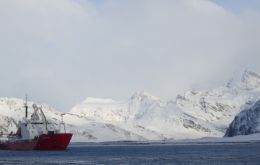
Surrounded by spectacular scenery, dominated by mountains and glaciers, construction has completed on a new £11million wharf, dolphin, and slipway to serve the King Edward Point Research Station (KEP), in South Georgia Island.
-
Thursday, April 30th 2020 - 07:30 UTC
Drilling in Antarctica to take bedrock samples from beneath the ice sheet

Two new research projects – in partnership with British Antarctic Survey engineers – will drill deeper than ever before in Antarctica and in space. The first project, called INCISED, is led by the University of Durham, funded by the European Research Council, and has set its sights on the Antarctic. It will drill bedrock from beneath the polar ice sheets, with the goal being to retrieve scientific samples.
-
Tuesday, April 28th 2020 - 15:35 UTC
New research shows sustainable fishing and conservation can coexist
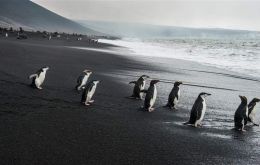
By surfbirds (*) – Our oceans are in trouble. Globally, poor fishing practices are directly damaging to marine wildlife, and overfishing can deplete food resources for animals such as seabirds and seals. However, research by BirdLife's Marine Program, in association with scientists from the British Antarctic Survey, (BAS) and the RSPB (BirdLife in the UK), shows that under current climate conditions, sustainable fisheries can exist alongside conservation measures for seabirds and seals in a well-managed Marine Protected Area.
-
Tuesday, February 25th 2020 - 07:30 UTC
South Georgia is evidence of whales recovery, a century after they were heavily exploited
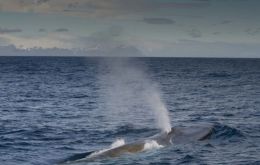
A team led by the British Antarctic Survey has just returned from the sub-Antarctic island of South Georgia, as the last of three expeditions to investigate the recovery of whales a century after they were heavily exploited. After 30 years of protection, large numbers of whales appear to be returning to the region.
-
Tuesday, February 18th 2020 - 06:38 UTC
Falklands' port development partner is also modernizing BAS Rothera station and a new wharf for RRS Sir David Attenborough
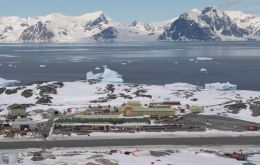
BAM Nuttall Ltd, which has been selected by the Falkland Islands Government, FIG, as the development partner to design and build a new port in Stanley Harbour is no adventurer in the South Atlantic and is closely linked to the UK efforts and investments in Antarctica. In effect, BAM Nuttall is involved in the building of the British Antarctic Survey's largest facility at Rothera Research station.
-
Saturday, October 26th 2019 - 08:51 UTC
BAS gearing for the Antarctic season: Halley station to reopen and modernization of Rothera to continue

Science and support teams from British Antarctic Survey (BAS) are gearing up for the start of the Antarctic summer field season. The first Twin Otter aircraft have arrived at Rothera Research Station, preparations are being made to reopen Halley Research Station, and the next construction phases of a major program to modernize Rothera and the islands stations are set to begin.
-
Friday, October 18th 2019 - 09:44 UTC
BAS technique to detect stranded whales from space
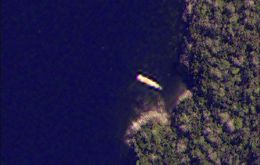
A new technique for analyzing satellite images may help scientists detect and count stranded whales from space. Researchers tested a new detection method using Very High Resolution (VHR) satellite images from Maxar Technologies of the biggest mass stranding of baleen whales yet recorded. It is hoped that in the future the technique will lead to real-time information as stranding events happen.
-
Friday, October 4th 2019 - 14:57 UTC
Falklands flagged, BAS latest incorporation: RRS Sir David Attenborough”

The Royal Research Ship RRS Sir David Attenborough, has been flagged to the Falkland Islands and officially named in a ceremony at Birkenhead, near Liverpool on Thursday September 26.
-
Thursday, April 25th 2019 - 09:30 UTC
Thousands of emperor penguin chicks died in 2016 destroyed by severe weather, reports a BAS team

Thousands of emperor penguin chicks drowned when the sea-ice on which they were being raised was destroyed in severe weather. The catastrophe occurred in 2016 in Antarctica's Weddell Sea. Scientists say the colony at the edge of the Brunt Ice Shelf has collapsed with adult birds showing no sign of trying to re-establish the population.
-
Friday, March 8th 2019 - 09:07 UTC
HMS Protector comes across an iceberg of 11 miles long and five wide
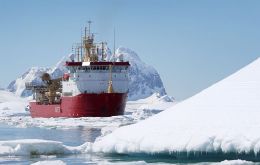
The Royal Navy’s Antarctic patrol ship encountered an iceberg the size of Bristol as she began her final scientific mission of the season. HMS Protector came across the enormous mass of ice and snow – 11 miles long and five wide – as she returned to the frozen continent for the last time this winter – or summer as it is in the Southern Hemisphere.
